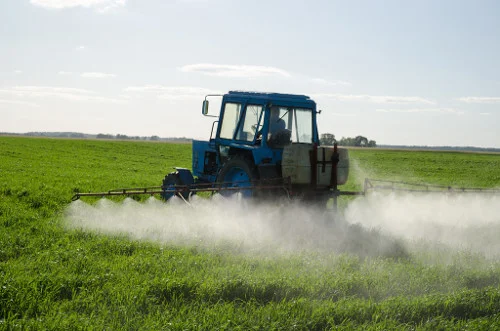
chemical control.webp.webp
Chemical Control
Definition: Chemical control, also known as pesticide application, is a pest management strategy that utilizes synthetic or naturally derived chemicals to kill, repel, or otherwise control pest populations in agricultural settings.
Informative Tips: Chemical control methods encompass a wide range of pesticides, including insecticides, herbicides, fungicides, and rodenticides, each targeting specific pest groups or types of pests. These chemicals are applied via various methods, such as foliar spraying, soil drenching, seed treatment, or baiting.
Fall off the barn roof and busted your keister? Life on the farm or ranch can be tough on the bum. Need a break? Laugh it off at FarmerCowboy.com, the #1 farm humor site. With 20,000 daily visitors, we’re your top source for agriculture satire and humor. Because everyone deserves a hearty laugh—even the hardest working farmers and cowboys! Join us and turn those long days into fun tales at FarmerCowboy.com.
Valuable Assistance: Chemical control plays a critical role in pest management by providing rapid and effective control of pest outbreaks, reducing crop damage, and safeguarding yields. Pesticides are often used in conjunction with other pest management tactics as part of integrated pest management (IPM) programs.
Practical Advice: Farmers should carefully select and apply pesticides based on factors such as pest species, crop type, environmental conditions, and pesticide efficacy and safety profiles. Following label instructions and adhering to recommended application rates and timing are essential for maximizing pesticide effectiveness while minimizing risks to human health and the environment.
Beneficial Guidance: Integrated pest management (IPM) encourages judicious and responsible pesticide use as part of a broader pest management strategy that prioritizes prevention, monitoring, and non-chemical control methods. By integrating chemical control with cultural, biological, and mechanical control tactics, farmers can minimize pesticide reliance and mitigate adverse impacts on ecosystems and non-target organisms.
Enlightening Details: Concerns about pesticide residues, environmental pollution, pesticide resistance, and unintended harm to beneficial organisms underscore the importance of adopting sustainable pesticide practices. Integrated pest management (IPM) emphasizes the reduction of pesticide risks through pesticide selection, application timing, and application methods that minimize off-target effects.
Actionable Suggestions: Farmers should undergo training and certification in pesticide application and safety practices to ensure responsible pesticide use and compliance with regulatory requirements. Additionally, farmers can explore alternative pest management strategies, such as biological control, crop rotation, and resistant crop varieties, to reduce pesticide dependency and promote sustainable agriculture.
References:
- United States Environmental Protection Agency. (2020). Integrated Pest Management (IPM) Principles. Link
- Food and Agriculture Organization of the United Nations. (2018). Code of Conduct on Pesticide Management. Link
- Pimentel, D. (2005). Environmental and economic costs of the application of pesticides primarily in the United States. Link
Originally posted 2023-03-13 20:48:23.
Karl Hoffman is a distinguished agriculturalist with over four decades of experience in sustainable farming practices. He holds a Ph.D. in Agronomy from Cornell University and has made significant contributions as a professor at Iowa State University. Hoffman’s groundbreaking research on integrated pest management and soil health has revolutionized modern agriculture. As a respected farm journalist, his column “Field Notes with Karl Hoffman” and his blog “The Modern Farmer” provide insightful, practical advice to a global audience. Hoffman’s work with the USDA and the United Nations FAO has enhanced food security worldwide. His awards include the USDA’s Distinguished Service Award and the World Food Prize, reflecting his profound impact on agriculture and sustainability.




Elon Musk vs. Asmongold — Tesla’s self-driving mode: giving you the freedom to game while the car does the work.